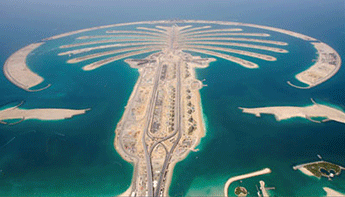
Class of ’87 | For most Persian Gulf countries, these are boom times. Oil-fueled economies such as Abu Dhabi, Dubai, Bahrain, Qatar, and Kuwait are awash in cash, and where there’s big business, big building projects are sure to follow. And wherever construction on a grand scale is happening in the region, chances are Hill International has something to do with it.
David Richter EAS’87 W’87 L’92 currently serves as president and chief operating officer of Hill, which was founded by his father, Irv, in 1976. Today, with 1,400 employees, offices across five continents, and revenues of more than $200 million, it’s a serious player in the international construction business.

“We manage construction projects,” Richter explains. “We’re typically engaged by the owner or the developer of the project, and what we then do is we manage the architects, the engineers, and the contractors. We look out for the owner’s interests.” In addition, Hill operates a construction claims group that advises owners or contractors involved in legal disputes.
Although Hill maintains offices all over the world, the Middle East accounts for 40 percent of its current business.
“We’ve had an office and projects there for a long time, since about the mid-’80s,” says Richter. “But things have really exploded in the last five years. There’s a tremendous construction boom going on, and I think because we got our foot in the door early enough, we’ve sort of ridden this boom, and we’re considered one of the premier firms over there.”
Hill’s portfolio in the region is impressive, to say the least. Perhaps the most arresting is the $1.5 billion Palm Jumeirah, one of three immense, palm-shaped artificial islands being constructed off the coast of Dubai. Commissioned by the late Sheikh Maktoum bin Rashid Al Maktoum, the former ruler of Dubai, the islands were conceived to create new beachfront real estate, and are said to be the largest and most ambitious land reclamation project in history.
“The island is truly spectacular,” says Richter. “We oversaw the construction of 1,300 villas there, the first of which were ready for occupancy in 2006.”
Some of Hill’s other projects in the region include the $137 million, 73-story Bin Samikh Tower, slated to be the tallest skyscraper in Doha, Qatar; the $2.7 billion Shams Abu Dhabi, an 82-million-square-foot complex of residential, office, hotel, and retail space, the highlight of which will be the 83-story Sky Tower; and Abu Dhabi’s Grand Mosque, the third largest mosque in the world.
Hill undertakes plenty of projects closer to its Marlton, New Jersey headquarters as well.
“We’re managing the Comcast Center, the tallest building in Philadelphia,” says Richter, “and we’ve been the program manager at Philadelphia International Airport for over 20 years. Also, we managed the new Liberty Bell Center, and the Constitution Center.”
The firm has also played a major role in Philadelphia Mayor John Street’s Neighbor-hood Transformation Initiative, an effort to demolish derelict structures in the city.
Joining the family business wasn’t foremost on Richter’s list of career goals. Having earned dual undergraduate degrees from the engineering school and Wharton in 1987, he came back to Penn a few years later to earn his law degree. He had toyed with the idea of becoming a real-estate developer, but after a grueling stint in the corporate practice group of a large New York law firm, Richter was beginning to feel burned out. When his father invited him to become Hill’s general counsel, he accepted.
Richter had his work cut out for him. Hill, at the time a small business of 200 people, was nearly bankrupt and mired in lawsuits.
“It was very touch-and-go for a while,” Richter recalls. “We were engaged in litigation even with our own banks, and losing money.”
He developed a strategy, and threw himself into the task of righting the ship. His first priority was making the company profitable, and he began by selling off a “very poorly performing environmental consulting unit.” He then marshaled his legal expertise to settle Hill’s numerous lawsuits, a daunting process that lasted some 18 months.
Next, he set about diversifying its operations.
Ultimately, his three-pronged approach to remedy Hill’s troubles overcame the highly unfavorable odds.
“I don’t know any firm in the world in that decade that lost money nine out of 10 years and survived, but we did,” says Richter, who credits his ability to oversee Hill’s impressive turnaround largely to his academic background. “My training was absolutely ideal for the business that Hill is in today. We really operate at the nexus between law, engineering, and business, and that’s exactly what I studied.”
One of the highlights of Richter’s tenure at Hill came in 2006 when the company went public, a long-cherished goal.
“My dad and I agreed completely that it made sense for us to be a public company,” says Richter. “I was sort of the driver of the process, and I went around interviewing investment banks and took the lead in hiring one, and today, I’m sort of the public face of the company to Wall Street and the investment community.”
On the day of the IPO, Richter and his father were invited to ring the opening bell of the NASDAQ, and to make a speech on the trading floor.
His engineering degree notwithstanding, Richter’s talents are better suited to boardrooms than drawing boards, a fact he cheerfully admits.
“I’m still the worst guy in the company to talk to if you have a problem on your construction project,” he says. “We’re a firm of experts. We have a lot of highly qualified people to manage construction projects—and I’m not one of them.”
—David Perrelli C’01

